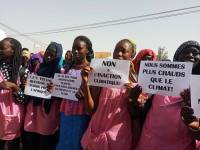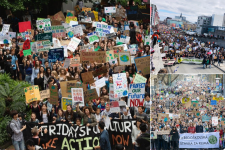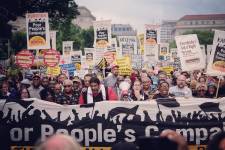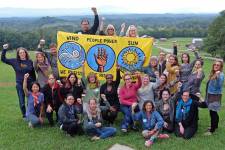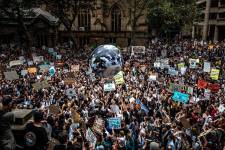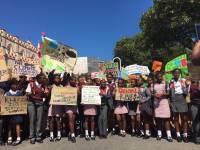GLOBAL – Over 1.6 million young students in more than 300 cities across all continents took to the streets this March 15th on the first ever global climate strike. Numbers were calculated according to Fridays for the Future, the movement that coordinated global climate strikes. Messages in more than 40 languages were loud and clear: world leaders must act now to address the climate crisis and save our future.
“The governments failed to respond properly to the dramatic challenge of our climate crisis. Our generation, the least responsible for the acts of the polluters, will be the ones to see the most devastating impacts of climate change. World leaders are losing the window to act, but we are not gonna stand still watching their inertia.” Greta Thunberg.
In Europe hundreds of thousands of school strikes saw students leaving their classrooms and joining the marches. France alone gathered 195 thousand in more than 110 cities.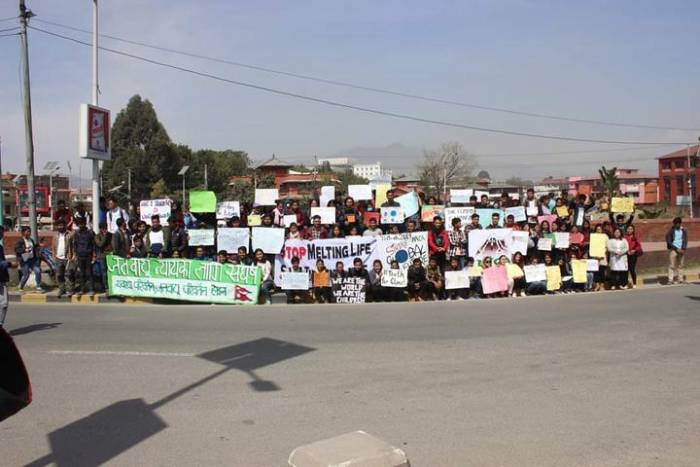
In India, more than 15 cities were involved in the strikes. In Colombia around 2.5 thousand gathered in the streets of Bogotá whilst Cape Town reported 2000 and 1,000 in Hong Kong.
Despite years of talks, governments have lost many opportunities to commit to concrete action and the global emission are reaching now an inevitable level.
The most recent UN Environment report, released in Nairobi on Wednesday, estimates that winter temperatures at the North Pole are likely to rise by at least 3oC above pre-industrial levels by 2050. And that even if global emissions were to halt overnight, winter temperatures in the Arctic would still increase 4°C to 5°C by 2100 compared to the late 20th century.
Over the coming months strikes are set to continue across the globe, with organisers already planning the next ones.
In September world leaders will be gathered once again and will have a chance to come with concrete, ambitious plans to reduce drastically their national emissions by shifting off coal, oil and gas immediately. By doing that they will show the young people that their voices were heard and that their effort was not in vain.
QUOTES
“In India, no one talks about climate change. You don’t see it on the news or in the papers or hear about it from government. We want global leaders to declare a climate emergency. If we don’t act today, then we will have no tomorrow. ” – Vidit Baya, 17, Udaipur, India.
“We face heartbreaking loss due to increasingly extreme weather events. We urge the Taiwanese government to implement mitigation measures and face up to the vulnerability of indigenous people, halt construction projects in the indigenous traditional realm, and recognise the legal status of Plains Indigenous People, in order to implement environmental protection as a bottom-up approach” – Kaisanan Ahuan, Puli City, Taiwan.
“We have reached a point in history when we have the technical capacities to solve poverty, malnutrition, inequality and of course global warming. The deciding factors for whether we take advantage of our potential will be our activism, our international unity and our ability to develop the art of making the impossible possible. Whether we succeed or not depends on our political will” – Eyal Weintraub, 18, and Bruno Rodriguez, 18, Argentina.
“I want to be certain that our government is committed to investing in a just transition to a more sustainable country, that we will lower carbon emissions and curb climate change. I am joining this strike to demand that decisions are more future-focused and that policy will reflect our environmental rights as written in our constitution” – Dona Van Eeden, 21, Cape Town, South Africa.
“The damage done by multinationals is enormous: the lack of transparency, dubious contracts, the weakening of the soil, the destruction of flora and fauna, the lack of respect for mining codes, the contamination of groundwater. In Mali, the state exercises insufficient control over the practices of the multinationals, and it is us, the citizens, who suffer the consequences. The climate alarm has sounded, and the time has come for us all to realise that there is still time to act locally, in our homes, our villages, our cities” – Mone Fousseny, 22, Mali.
